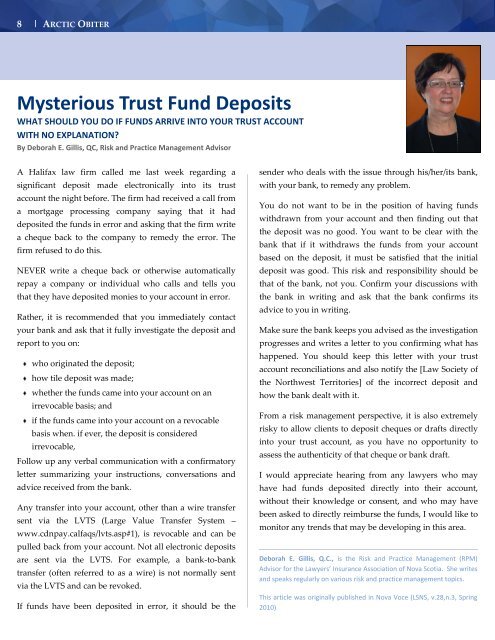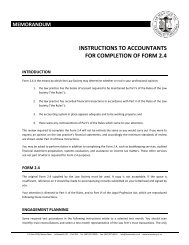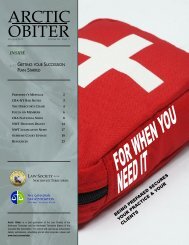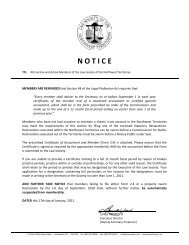ARCTIC OBITER
Arctic Obiter - May 2010 - Law Society of the Northwest Territories
Arctic Obiter - May 2010 - Law Society of the Northwest Territories
- No tags were found...
Create successful ePaper yourself
Turn your PDF publications into a flip-book with our unique Google optimized e-Paper software.
8 | <strong>ARCTIC</strong> <strong>OBITER</strong><br />
Mysterious Trust Fund Deposits<br />
WHAT SHOULD YOU DO IF FUNDS ARRIVE INTO YOUR TRUST ACCOUNT<br />
WITH NO EXPLANATION?<br />
By Deborah E. Gillis, QC, Risk and Practice Management Advisor<br />
A Halifax law firm called me last week regarding a<br />
significant deposit made electronically into its trust<br />
account the night before. The firm had received a call from<br />
a mortgage processing company saying that it had<br />
deposited the funds in error and asking that the firm write<br />
a cheque back to the company to remedy the error. The<br />
firm refused to do this.<br />
NEVER write a cheque back or otherwise automatically<br />
repay a company or individual who calls and tells you<br />
that they have deposited monies to your account in error.<br />
Rather, it is recommended that you immediately contact<br />
your bank and ask that it fully investigate the deposit and<br />
report to you on:<br />
who originated the deposit;<br />
how tile deposit was made;<br />
whether the funds came into your account on an<br />
irrevocable basis; and<br />
if the funds came into your account on a revocable<br />
basis when. if ever, the deposit is considered<br />
irrevocable,<br />
Follow up any verbal communication with a confirmatory<br />
letter summarizing your instructions, conversations and<br />
advice received from the bank.<br />
Any transfer into your account, other than a wire transfer<br />
sent via the LVTS (Large Value Transfer System –<br />
www.cdnpay.calfaqs/lvts.asp#1), is revocable and can be<br />
pulled back from your account. Not all electronic deposits<br />
are sent via the LVTS. For example, a bank-to-bank<br />
transfer (often referred to as a wire) is not normally sent<br />
via the LVTS and can be revoked.<br />
If funds have been deposited in error, it should be the<br />
sender who deals with the issue through his/her/its bank,<br />
with your bank, to remedy any problem.<br />
You do not want to be in the position of having funds<br />
withdrawn from your account and then finding out that<br />
the deposit was no good. You want to be clear with the<br />
bank that if it withdraws the funds from your account<br />
based on the deposit, it must be satisfied that the initial<br />
deposit was good. This risk and responsibility should be<br />
that of the bank, not you. Confirm your discussions with<br />
the bank in writing and ask that the bank confirms its<br />
advice to you in writing.<br />
Make sure the bank keeps you advised as the investigation<br />
progresses and writes a letter to you confirming what has<br />
happened. You should keep this letter with your trust<br />
account reconciliations and also notify the [Law Society of<br />
the Northwest Territories] of the incorrect deposit and<br />
how the bank dealt with it.<br />
From a risk management perspective, it is also extremely<br />
risky to allow clients to deposit cheques or drafts directly<br />
into your trust account, as you have no opportunity to<br />
assess the authenticity of that cheque or bank draft.<br />
I would appreciate hearing from any lawyers who may<br />
have had funds deposited directly into their account,<br />
without their knowledge or consent, and who may have<br />
been asked to directly reimburse the funds, I would like to<br />
monitor any trends that may be developing in this area.<br />
Deborah E. Gillis, Q.C., is the Risk and Practice Management (RPM)<br />
Advisor for the Lawyers’ Insurance Association of Nova Scotia. She writes<br />
and speaks regularly on various risk and practice management topics.<br />
This article was originally published in Nova Voce (LSNS, v.28,n.3, Spring<br />
2010)
















